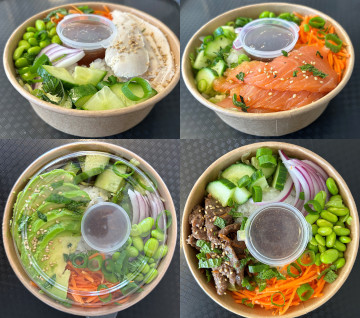About Sushi
Did you know?
- An average portion of sushi between 4-8 pieces, contains around 250 to 300 calories.
- An easy way to eat the recommended two servings of fresh fish a week.
- Sushi can provide many different vitamins, minerals and antioxidants for your daily diet intake.
- It is believed that the higher life expectancy for both men and women in Japan is linked to their healthy diet which includes daily servings of sushi.
- There are approximately over 25,000 people currently over the age of 100 in Japan
- Japan has 96% fewer men suffer coronary heart disease than in England
- Only six in 100,000 Japanese women contract breast cancer, this is 20 times less than in England.
The benefits of eating sushi...
Gari: A Japanese sweet pickled ginger.
- Boosts your immune system to help the body fight off viruses and other bacteria.
- Is a natural antiseptic.
- Assists the beneficial bacteria Lactobacillus that helps aid digestion. It also reduces harmful bacteria including E Coli, and Salmonella.
Rice vinegar:
The vinegar used to flavour the rice is made from fermented rice or rice wine.
- Great antibacterial properties.
- Helps to lowers blood pressure.
Soy sauce:
- Is a fermented sauce made from soybeans (soya beans), roasted grain, water and salt.
- Is high in iron, protein, magnesium and potassium.
Nori sheets:
- The Japanese name for edible seaweed.
- A great source of antioxidants, such as beta-carotene, and B1 (thiamine, that keeps nerves and muscle tissue healthy), B2 (riboflavin, which helps to absorb iron) and vitamin B12.
- It contains trace elements, such as chromium, which affects the way insulin behaves. Zinc, which has a healing quality.
- Helps prevent cholesterol levels building up in your blood.
Wasabi:
- Known as Japanese horseradish, its root is ground up and used as a spice.
- High in vitamin C.
- Helps digestion.
- Has mild antiseptic qualities and has powerful anti-bacterial properties.
High in protein, minerals and Zinc. Contains omega-3 oils which help in preventing heart diseases, strokes, arthritis and mild depression.
High in complex carbohydrates and is also gluten-free.
What is Sushi?
Sushi is made out of rice, with a slice of raw fish (tuna, salmon, schrimp, etc...), or a slice of cooked or marinated fishmariné (eel, cuttlefish, schrimp, octopus, etc...), and / or other things such as egg, caviar, avocado, cucumber, vegetables etc...
A "sushi-maki" is a roll made out of rice and filling (raw fish, cooked fish, marinated fish, vegetables etc...) rolled in a sheet of dry sea-weed (nori).
Rice is flavoured with vinegar (called Su) and sweetend with Mirin, wasabi, etc... according to a traditional recipe.
History of Sushi
Sushi's origin goes back to the 4th century BC in China. Cleaned fish was kept in rice so that the natural fermentation of the rice helped keep the fish fresh. This "sushi" was taken out of the storage after a couple of months, only the fish was eaten and the rice was discarded.
Around the 8th century AD it was introduced to Japan. The sushi was eaten while the fish was still partly raw and the rice had not lost its flavor yet. This became more of a cuisine rather than a way to preserve fish.
In the Edo era, the Japanese began making a sushi that was a way to eat both the rice and fish. The rice was mixed with vinegar and sweetened with mirin combined not only with fish but also with various vegetables and other foods. Even today, each prefecture of Japan still maintains its own unique taste by from their local products in making different kinds of sushi that have been passed on for generations.
Not until the 1980s had the Western world focused on sushi. Due to the increase of health conscious people sushi bars have opened up in almost all Western countries. With the introduction of sushi machines, which combines the mass production of sushi with the delicate skills used by sushi chefs, making and selling sushi has become more accessible to countries all over the world.






